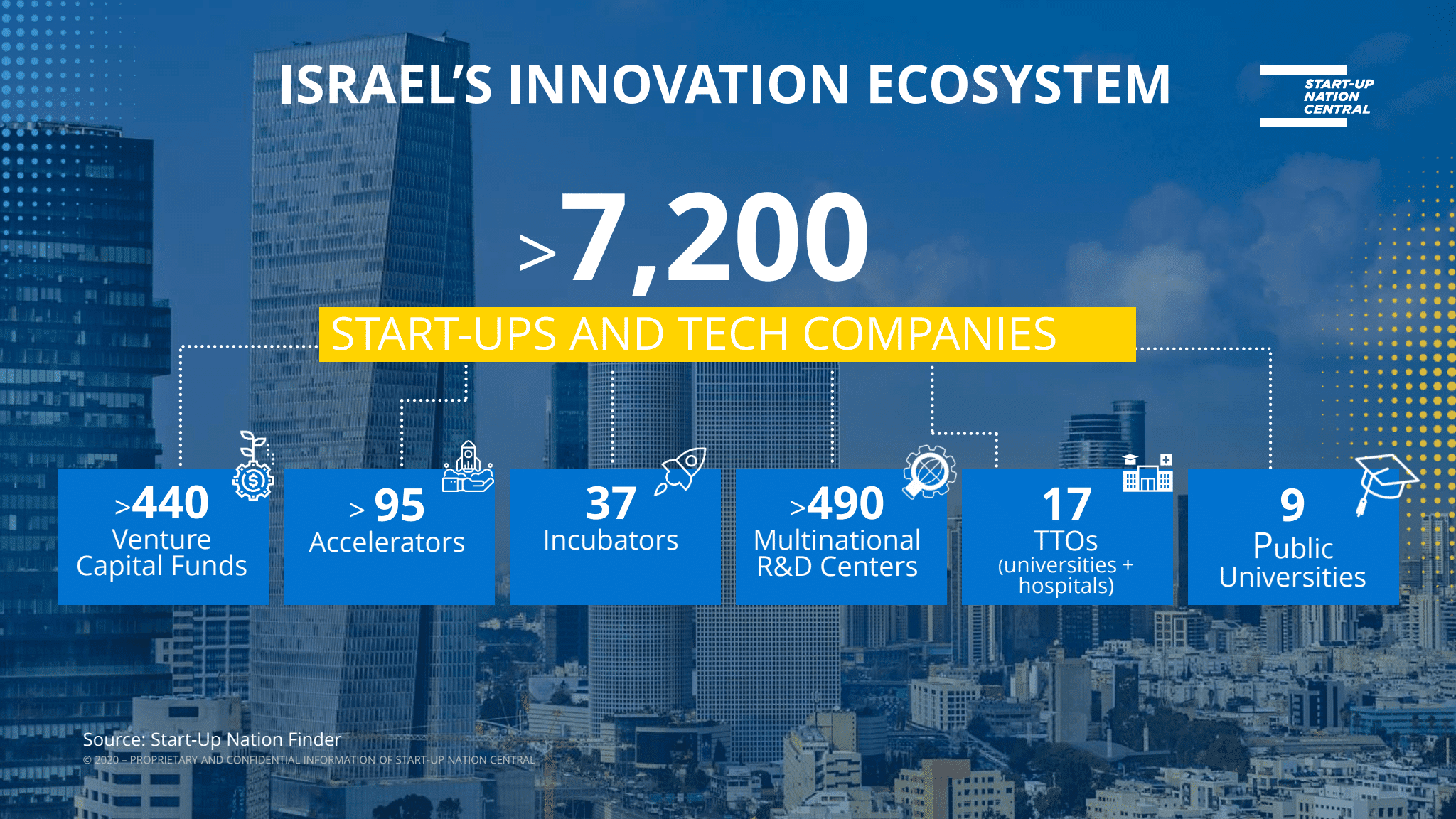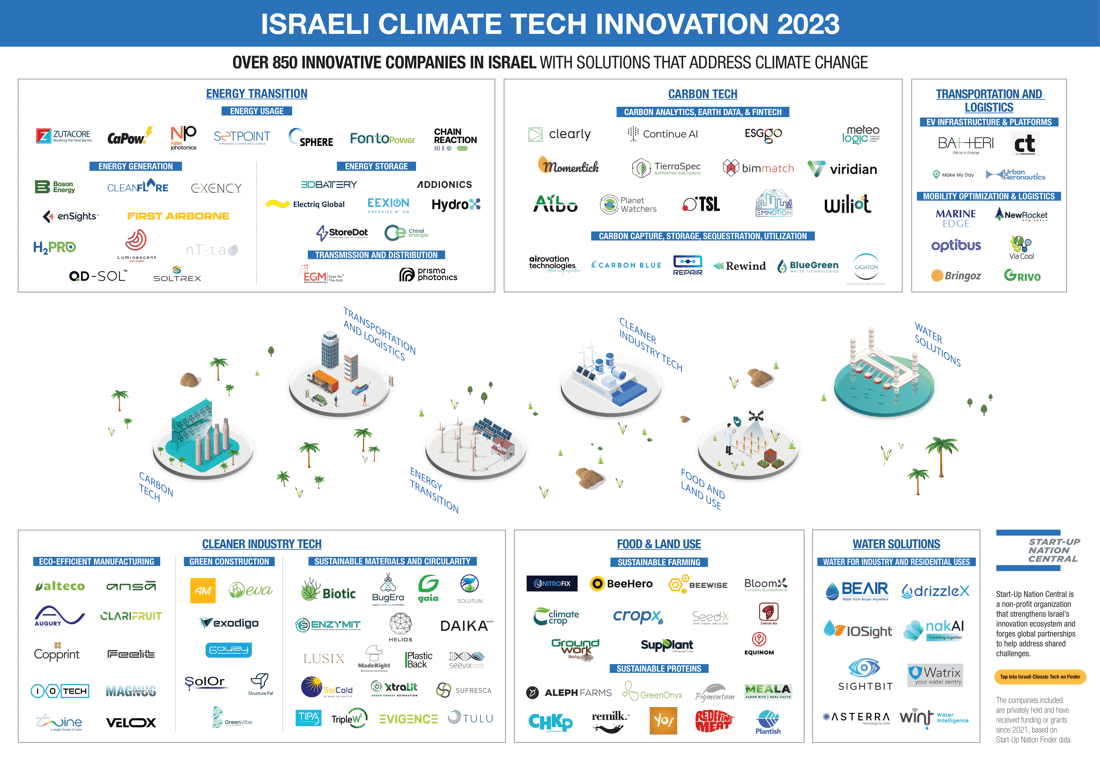As the world gears up for COP28, the United Nations climate change conference will take place at the end of 2023 in Dubai, and urgent action is needed to address the challenges posed by our changing climate. Israeli Climate Tech has the potential to make a big difference.
This past year, we’ve experienced adverse effects of climate change with record-breaking heat waves and droughts, energy prices reaching unprecedented heights, and other anomalies. Simply put, the earth is burning, and our inaction has become too costly to ignore.
The time for talking has long passed.
COP27 2022 in Sharm El Sheikh, Egypt, brought world leaders together to discuss how to address climate change and reach net zero. One of the most significant outcomes of COP27 was the announcement of the expansion of the First Movers Coalition, a private-public partnership led by the World Economic Forum addressing climate change. The coalition pledged an unprecedented $12 billion in purchases to bring innovative technologies to market and make procurement commitments for technologies in hard-to-abate sectors. This commitment sends the largest-ever demand signal to the marketplace for climate tech breakthrough innovation. It communicates to researchers, entrepreneurs, and private investors that, with climate tech, ‘if you build it, (the market) will come.’
Climate change affects countries, governments, corporations, organizations, academia, non-profits, and people worldwide. This means that to address it, we will need broad cooperation between stakeholders at all levels and across geographies. The focus must also be on accelerating collaborative tech innovation. We need more technologies that mitigate or remove carbon emissions and help us adapt better to climate change – and we also need these technologies to be more efficient and cost-effective.
This is the key to addressing climate change.
COP28 Dubai: Regional Collaboration for a Brighter Future
Many countries are implementing initiatives aligned with Sustainable Development Goals (SDGs) to halt and reverse climate change. This set of 17 interconnected objectives outlined by the United Nations aims to create a more equitable and sustainable world. Achieving these SDGs will require a global effort, with countries and organizations working together. This is where the regional alliance is crucial; creating deep ties at all levels paves the way for knowledge sharing, ecosystem building, and sourcing tech solutions to shared challenges. It is an opportunity to impact the people by generating employment opportunities and addressing water scarcity, energy, and food security.
As we approach COP28, we must accelerate our efforts to achieve the SDGs. By continuing to support and invest in climate tech, we can leverage innovative solutions to address some of the world’s most pressing environmental challenges. However, this will require a concerted effort from governments, investors, and businesses worldwide.
Stakeholders in Israeli Climate Tech for COP28
Governments play a key role in supporting the growth of the climate tech ecosystem by creating supportive policies and funding initiatives to foster innovation and entrepreneurship in the field of sustainability. Incentivizing climate-focused development and implementation will ensure that innovative solutions make it to market without getting stuck in research phases.
Investors also have a vital role to play. By investing in climate tech startups, investors can not only help address global climate challenges but also potentially generate significant financial returns. According to a 2018 report, climate tech solutions have the potential to generate up to $26 trillion in economic benefits by 2030. Impact investing in climate innovation isn’t just right—it is also smart.
Finally, businesses play a key role in driving the growth of the climate tech ecosystem. By partnering with startups and investing in their technologies, businesses can reduce their environmental impact and potentially gain a competitive advantage in the market. And this is a strong business reason for fostering regional collaborations on climate tech innovation.
The journey to COP28 will be challenging, but we have the tools and technologies to progress significantly. Climate change knows no geographic or political boundaries: to combat this pressing issue effectively, countries in the region need to work collaboratively to develop and scale the innovation needed to achieve net zero. And Israel has the innovative know-how to help get there.

While the Startup Nation is globally recognized as an industry leader in fintech, cyber tech, and more, Israel’s climate tech sector can potentially play a significant role in attaining sustainability goals. The country’s ecosystem of innovative startups, experienced investors, and supportive government policies is well-positioned to drive the development and adoption of innovative technologies to address climate challenges.
Israel’s Climate Tech Ecosystem
Over the past decade, Israel has emerged as a major player in climate tech, with a thriving ecosystem of startups, investors, and support organizations dedicated to building innovative solutions to the world’s most pressing challenges. In this context, Israel’s growing climate tech ecosystem has a crucial role to play.
Israel’s climate tech sector today comprises over 850 companies. According to Finder data, these companies have raised more than $7.9 billion in private funding since 2019, with investments coming from both local and international sources.
At the heart of Israel’s climate tech ecosystem are key strengths that set it apart from other regions. These include:
- World-class research institutions: Israel is home to some of the world’s leading research institutions, which provide a solid foundation for the development of new climate technologies.
- A culture of innovation: Israel has long been known for its entrepreneurial spirit and willingness to take risks and experiment with new ideas. This is in part due to dire necessity due to the lack of natural resources and other existential challenges. This has helped to fuel the growth of the country’s climate tech ecosystem.
- Israel’s tech ecosystem is designed to address the needs of other markets first. Since Israel is a small country with a small domestic market, over 80% of the innovation generated by local startups targets the global markets first. This means the solutions developed in Israel are designed to fit the regulations and the business needs of stakeholders abroad from the get-go, including in the global south.
- Strong organizational support: A wide range of stakeholders and organizations advocate for developing the country’s climate tech sector, providing funding and other resources to help support startups and encourage innovation in the field.
How Israeli Climate Tech is Propeling SDGs
Israeli companies are pioneering scalable solutions in sustainability and environmental technology. According to data collected by Finder, focus areas include:
- Energy Transition:
One of the key SDGs is to increase the share of renewable energy in the global energy mix. Close to 200 Israeli startups are at the forefront of developing new technologies in this area, including leveraging AI and machine learning to optimize the performance of renewable energy systems, developing disruptive hydrogen technologies, developing better and alternative energy storage solutions, and more.
- Food & Land Use:
Another important SDG is to ensure sustainable agriculture and food production. In this context, over 250 start-ups are developing innovative solutions that help farmers increase yields and reduce water consumption and waste while also minimizing the use of harmful chemicals and developing alternative food sources to ensure food security in a changing climate.
- Transportation & Logistics:
Transportation is a major contributor to greenhouse gas emissions, making it a key area for action in the fight against climate change. These new technologies propel electric vehicle adoption; advance sustainable fuels for aviation and more efficient engines, optimize logistics systems, and expand access to public transport.
- Water Solutions:
Israel is one of the driest countries in the world, and water scarcity has been a pressing issue for decades. Israel’s innovative water management practices have not only helped it survive but also thrive in arid conditions. These solutions are now having a global impact. For example, devices that extract drinking water from the air have been deployed in over 100 countries, assisting water-stressed regions worldwide.
- Carbon Tech:
Monitoring and removing emissions and improving our understanding of climate are essential to helping us mitigate and adapt to climate change. Innovation in this area is focused on developing novel, efficient ways to capture carbon, utilize it for new products, store it, and monitor carbon emissions in different settings that can help businesses and people make the necessary decisions to address the challenge.
- Clean Industry Tech:
SDG 9 aims to build resilient infrastructure, promote sustainable industrialization, and foster innovation. Solutions are being developed in Israel to promote the use of more sustainable and circular materials and to implement advanced manufacturing processes that are more energy-efficient and less wasteful.

[source: Startup Nation Central]
Alliances between Israel and regional partners have the potential to generate genuine, sustainable impact. By creating a frictionless platform for joint engagements, knowledge sharing, and the exchange of technological solutions to shared climate challenges, Startup Nation Central is bringing Israeli climate tech to the broader MENA region and to the world.
We’ll bring Israeli Climate Tech to COP28 in Dubai this winter – stay tuned!
